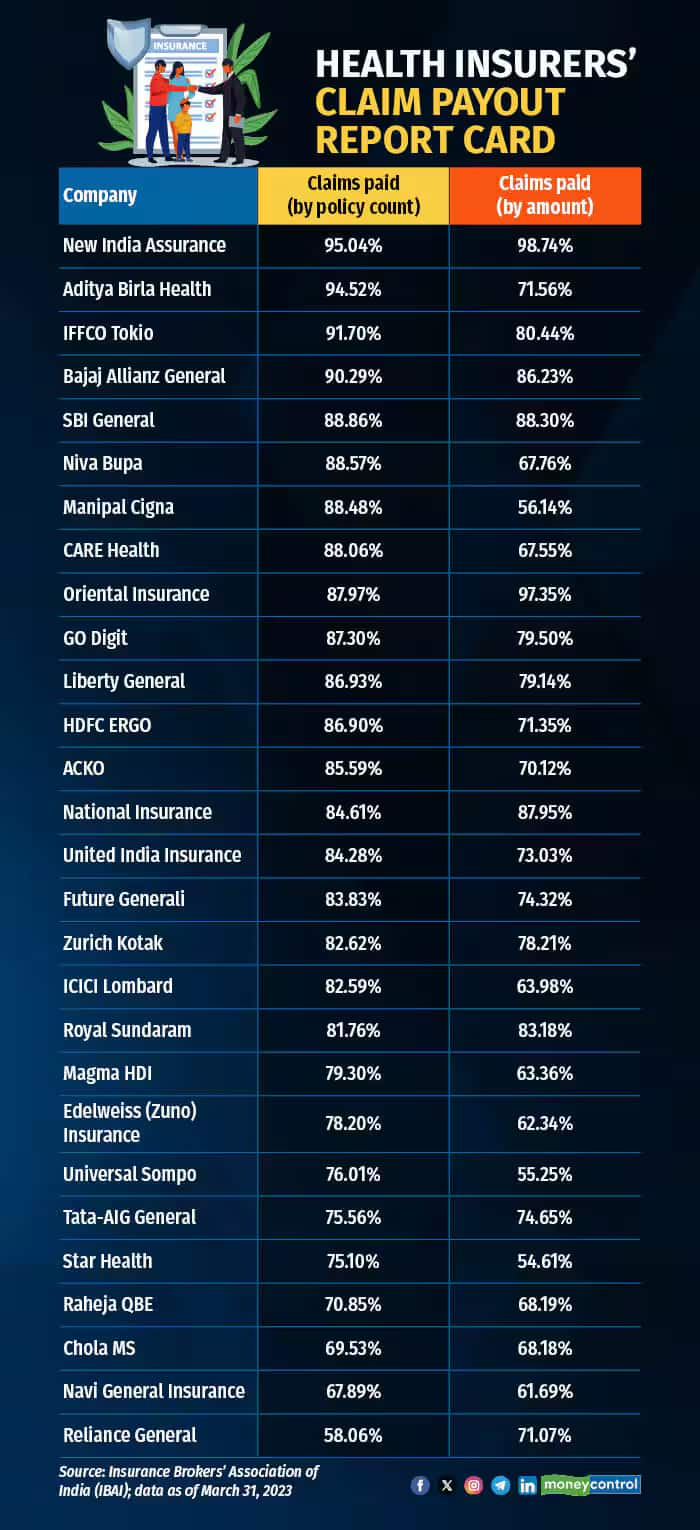



The menace of high health insurance claim rejections has been making headlines since November, when the Insurance Brokers’ Association of India (IBAI) released the claim settlement track record of all insurance companies across life, health and general segments.
According to the Insurance Ombudsman annual report for the year 2023-24, 95 percent of health insurance complaints pertain to partial or complete rejection of claims.
On Thursday, social media portal and survey firm LocalCircles released a survey that said that over 50 percent of health insurance policyholders polled had faced complete or partial claim rejections in the last three years. The most common causes of disputes include ‘unreasonable’ hospital charges, non-disclosure of pre-existing diseases and partial settlement due to room rent sub-limits, among others.
Also read: New India, Oriental top health insurance claim payout list in terms of amount paid

Often, insurance companies reject claims citing the reasonable and customary charges clause in insurance policies, according to the Insurance Ombudsman annual report. “Customers should be educated on the terms and conditions of the policy. Insurers should adopt a uniform practice in settling the amount of claim under Cataract treatment, the report noted. It also called for a clear condition or exclusion in the policy document regarding fees charged by specialists, physicians or surgeons engaged in the treatment of critical illnesses during hospitalisation. “In some cases, hospitals do not include the same in their bill and raise a separate bill. As a result, customers are not clear as to the amount to be claimed under the particular policy,” it said.
This clause in health policies says that ‘reasonable and customary charges’ mean that the charges for treatment are the standard charges for the specific provider and are in line with the prevalent charges in the geographical area for similar quality and services.
Now, insurers unilaterally take the call on what is reasonable based on the data they may have collected over time. Policyholders do not have access to this data and cannot assess whether hospitals’ charge structures are reasonable or not. This ambiguity often leads to heartburn for policyholders, as ‘reasonable’ costs for treatment procedures could vary as per the patient’s overall health condition, hospital location and the category of hospital – for instance, corporate hospitals tend to charge much higher rates.
Claim rejection on the grounds of pre-existing diseases is another common ground for disputes between insurers and policyholders. According to a study conducted by online insurance aggregator Policybazaar.com in 2023, around 25 percent of claims are rejected on the grounds of non-disclosure of lifestyle conditions such as diabetes and hypertension.
Pre-existing illnesses refer to diseases or conditions that the policyholder had contracted before buying the policy. As per IRDAI’s definition, pre-existing diseases are conditions or ailments for which the policyholder had received treatment or diagnosis from a physician up to 36 months prior to the policy purchase.
Insurers do not pay for the treatment of such diseases until a specified ‘waiting’ period – a maximum of three years as per the Insurance Regulatory and Development Authority of India’s (IRDAI) new health insurance regulations – has passed. This is because insurance, by principle, is meant to cover unforeseen risks – covers cannot be extended to known illnesses immediately.
Concealing your health condition at the time of buying insurance can land you in trouble in future. Not only can health insurers reject claims in such cases but also cancel the policy citing breach of contract. If you are covered under a family floater and are found to have concealed an illness prior to buying the plan, your family, too, will be deprived of a cover in such cases.
Be transparent, read policy terms and conditionsAt your end, ensure that you answer all the questions in the proposal form accurately. Do not let your agent complete the form and do not make the mistake of assuming that you need not disclose ‘minor’ ailments or health conditions. Be extremely careful about such disclosures at the time of porting your policy to another insurer – do not assume that the new insurer will have access to your past claim track record with the older insurer. Ensure that you are completely honest about your health conditions – even if it means shelling out higher premiums – to avoid disputes later.
Be aware of your policy terms on room rent sub-limits and other restrictions that can result in partial settlement of claims. Affordability permitting, avoid buying policies with room rent sub-limits.
Dealing with claim rejections due to the reasonability clause is, however, trickier as policyholders do not have any control over hospitals’ costs or insurers’ assumptions of fair charges. Independent industry experts have been calling upon insurers to be transparent about their assessment of the charges' reasonableness – for instance, they could indicate the range of ‘reasonable’ treatment costs for angioplasty or appendicitis surgery.

If you are unhappy with your insurance company’s decision on your claim, write to its grievance redressal officers (GRO) with your complaint. You can also file your grievance through IRDAI’s Bima Bharosa portal. If the insurer is unable to resolve the complaint to your satisfaction within 30 days or fails to respond, you can approach the insurance ombudsman offices in your district. You do not need to pay any charges to escalate your complaint to the ombudsman offices.
If the ombudsman feels that the issue can be resolved through mediation, an order will be passed within one month of having received the mutual written consent for such mediation. In other cases, the ombudsman will pass an ‘award’ within three months from the date of receipt of all the documents and other information from the aggrieved policyholder.
Discover the latest Business News, Sensex, and Nifty updates. Obtain Personal Finance insights, tax queries, and expert opinions on Moneycontrol or download the Moneycontrol App to stay updated!
Find the best of Al News in one place, specially curated for you every weekend.
Stay on top of the latest tech trends and biggest startup news.